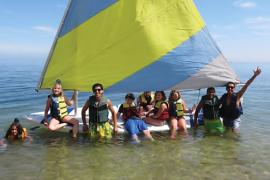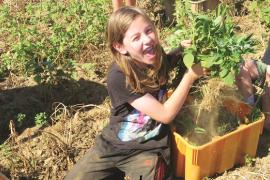Rachel Simmons, author of The Curse of the Good Girl and co-founder of Girls Leadership Institute, recently wrote an opinion piece for CNN.com about the reluctance many girls feel toward leadership roles. She argues that in order to take advantage of the access they now have to such positions, girls need to feel authorized. (Read the article, “Teach Girls to Be More Like Boys,” at www.cnn.com/2013/04/30/opinion/simmons-girls-leadership.) Simmons, who worked at camp and ran a summer camp for many years, believes that these experiences can provide girls with the skills they need to feel comfortable as leaders. In this interview, she speaks to Camping Magazine about creating intentional camp experiences centered on relationship building, asserting oneself, and taking risks.
Could you talk a little bit about girls and leadership? How do they feel about asserting themselves and who they are?
I don’t want to speak for all girls here, but I think many girls grow up in a culture that is still confused about how powerful it wants girls to be. On the one hand, so many doors have opened to girls in terms of what they’re committed to do and apply for and enjoy. On the other hand, there are still messages about how assertive it’s OK to be; how self-promoting it’s OK to be. And the result is what I call a “yes, but” mentality.
The message girls hear is, “Yes, be strong, but don’t offend anybody. Yes, be successful, but don’t brag about it and make anyone feel bad. Yes, be confident, but do it quietly.” It’s like we’re asking girls, “Can’t you just be confident quietly?” And you can be confident quietly, but a direct result is that girls start to worry about situations in which they will be seen as too loud, too assertive, too bossy. And, of course, being able to assert your authority is a huge part of leadership.
The point that I’m trying to make is that even as we’re talking about books like Lean In and exploring as a society the challenges that women face, these issues begin very early in girlhood. You start hearing girls’ doubts and anxieties about leadership very young, and by the time they get to college, you can see an ambition gap, a confidence gap, and a skills gap.
What should we tell young girls? How do we give girls the confidence to express their leadership at a young age in camp?
What I learned through all my years working in camp was that summer camp, in particular, offers many opportunities for girls to develop these skills early on. But part of that depends on the culture that the camp creates.
The adults at the camp have to make a decision to promote and reward the girls who are not conventionally feminine or what I would call “good girls.” Counselors have to hold up and make special the girls who embody the leadership qualities that we want other girls to aspire to. I believe that girls’ friendships provide lots of op¬portunities to develop leadership skills, so helping girls become comfortable asserting themselves to each other is a big step.
When girls can say, “I don’t like how you treated me today. I want to sit in the front of the boat. I want the top bunk for the second session,” they are building the skills that they will need to become leaders. But those opportunities are available in everyday relationships.
So that can go hand in hand with being careful not to reinforce old gender stereotypes at camp, too. For example, allowing campers to pick what activities they’d like to do versus having “boy activities” and “girl activities.”
Right. And at Girls Leadership Institute, we have activities like ropes courses that we use very intentionally. We tell the ropes course operators, “We are trying to build these skills in our girls: comfort taking risks, sticking up for yourself, working together in a group.” And then the ropes course operators can actually design a program that targets the development of those skills.
So again, summer camp has very organic, everyday opportunities for girls to feel comfortable being authentic and asser¬tive. But the camp has a major role in also being intentional about that.
It’s probably also really important to model relationship-building behavior because the girls absorb everything their counselors do.
Exactly. Counselors and camp staff will, of course, have favorites — it happens. There are just some kids that we gravitate toward more than others. But counselors need to be particularly mindful of that and at least be aware enough to know who they’re gravitating toward. It’s OK to be connected to certain kids more than others, but a lot of times we are drawn to the more “popular” girls because often they’re charismatic and know how to connect with adults a lot better.
So who are the girls in your bunk or your group who are less popular but possess the qualities that you think other girls should have more of? Typically, the girls who are the most original and authentic are not necessarily the ones who are the most popular.
For example, when I was a counselor, we had a camper who some might consider nerdy, and she was very outspoken, articulate, clever, and witty. She was not the kind of girl that other girls would necessarily promote socially or gravitate toward, but the counselors fell in love with her. And because we loved her, the other girls did too.
Staff must take seriously the power and influence they have on kids. If campers see you rallying around the girls who normally get overlooked, it’s a game changer. This is true for all campers — boys and girls. Find a trait or traits in each camper that make him or her special. It will be easy to find these traits in some campers, and you might have to work a bit harder to find these traits in others.
Since relationships are so important to girls’ development, do you have any strategies for helping girls who might be struggling to create friendships?
There’s no blanket answer for this because usually when kids have trouble making friends, there’s an individual profile of each kid that you have to take into account. But I do think it’s important for staff not to impose their own social needs and social assumptions onto a kid.
For example, if you have a camper who is struggling to make friends, my guess is that the camper is struggling wherever she goes. So take the time to ask the child about her social life outside of camp: Find out who her friends are at school, who her closest friend is, and how many close friends she has.
If you hear from the camper that there are not a lot of friends in the picture to begin with, you’ll also understand that maybe she will need only one friend at camp. A lot of times, we assume that a child needs a whole bunch of friends. But if that’s not what she has at home, it’s typically not going to be what she has at camp either.
Staff are right to understand that rela¬tionships are important to girls’ development, but they must also understand that every camper is different and might not have the same social needs.
What advice would you give to staff trying to instill leadership skills in girls?
Take the time to set small goals for your campers that they can try to accomplish while at camp. These can include things like saying “hi” to a person you don’t know or trying a new activity that makes you a little uncomfortable or that seems scary. Ask your campers, “What’s one thing you want to try to accomplish this week or this summer? Something that maybe would require you to take a risk or that is some¬thing you wouldn’t normally do.” And tell her that you’re going to try to accomplish it together.
That does two things: First, it identifies a risk and a point of possible development for a girl. Second, it allows her to pursue that goal in a close relationship with a counselor. And for girls, relationships are really important for their growth.
Girls are much more likely to take risks and try new things and push them¬selves when they know they have a close relationship standing behind them. So if counselors could help campers set small goals, I think that’d be amazing. You have the perfect opportunity to really work with a girl over time.
Additional Resources
The Curse of the Good Girl, Rachel Simmons, 2009: www.rachelsimmons.com/books-and-articles/curse-of-the-good-girl/
More books by Rachel Simmons: www.rachelsimmons.com/books-and-articles/
Girls Leadership Institute: www.girlsleadershipinstitute.org/
“Cyberbullying: Camp’s Role in Helping Girls Disengage from an Online World — An Interview with Rachel Simmons,” March/April 2012 Camping Magazine: www.ACAcamps.org/campmag/1203/cyberbullying-camps-role-helping-girls
“Putting Camp in the Childhood Equation: A Conversation with Rachel Simmons and Michael Thompson,” May/June 2010 Camping Magazine: www.ACAcamps.org/campmag/1005/putting-camp-childhood-equation
Lean In, Sheryl Sandberg, 2013: http://leanin.org/book/
Originally published in the 2013 November/December Camping Magazine


